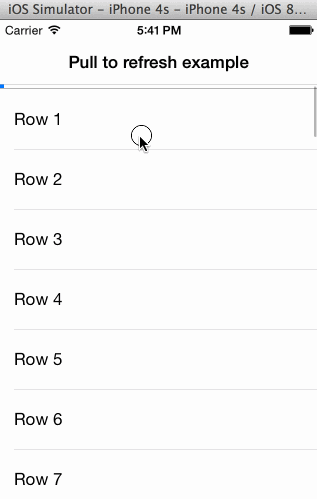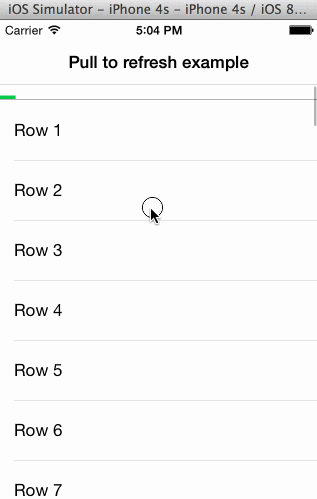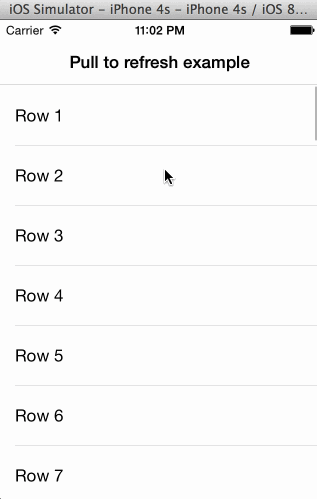This library is no longer maintained. I am not using it in any of my projects, and I, unfortunately, don't have time to maintain it in my free time. Please open an issue if you are willing to become the new maintainer.
Refresher is pull to refresh library written in Swift. It provides easy to use UIScrollView methods to add pull to refresh to your view. Refresher also supports custom animations.
tableView.addPullToRefreshWithAction {
NSOperationQueue().addOperationWithBlock {
sleep(2)
NSOperationQueue.mainQueue().addOperationWithBlock {
self.tableView.stopPullToRefresh()
}
}
}Refresher supports custom animations on PullToRefreshView. You need to create object that conforms to PullToRefreshViewAnimator protocol.
Then, just pass your custom animator in addPullToRefrshWithAction:
tableView.addPullToRefreshWithAction({
NSOperationQueue().addOperationWithBlock {
sleep(2)
NSOperationQueue.mainQueue().addOperationWithBlock {
self.tableView.stopPullToRefresh()
}
}
}, withAnimator: CustomAnimator())Required methods that your custom object need to implement are:
func pullToRefreshAnimationDidStart(view: PullToRefreshView)- Called when user releases finger and when loading actually starts. Start your animations here.func pullToRefreshAnimationDidEnd(view: PullToRefreshView)- Called when animation is over. Perform any necessary after animation cleanup here.func pullToRefresh(view: PullToRefreshView, progressDidChange progress: CGFloat)- Called while user is pulling scroll view. Useful if you want to implement some kind of progress like behaviour.func pullToRefresh(view: PullToRefreshView, stateDidChange state: PullToRefreshViewState)- Called whenPullToRefreshViewchanges its state
You can use your own custom UIView subclass as pull to refresh view.
if let customSubview = NSBundle.mainBundle().loadNibNamed("CustomSubview", owner: self, options: nil).first as? CustomSubview {
tableView.addPullToRefreshWithAction({
NSOperationQueue().addOperationWithBlock {
sleep(2)
NSOperationQueue.mainQueue().addOperationWithBlock {
self.tableView.stopPullToRefresh()
}
}
}, withAnimator: customSubview)
}Your custom subclass has to conform to PullToRefreshViewDelegate.
- Xcode 6
- iOS 8.0
- Add Refresher as a git submodule into your top-level project directory or simply copy whole folder
- Find
PullToRefresh.xcodeprojand drag it into the file navigator of your app project. - In Xcode, navigate to the target configuration window by clicking on the blue project icon, and selecting the application target under the "Targets" heading in the sidebar.
- Under "General" panel go to "Linked Frameworks and Libraries" and add
Refresher.framework
- Simply download Refresher
- Build it and you should find
Refresher.frameworkunder "Products" group. - Right click on it and select "Show in Finder" option.
- Just drag and drop
Refresher.frameworkto your project
- Add
pod 'Refresher'to your Podfile - Run
pod install
Refresher is created by Josip Ćavar and inspired by SVPullToRefresh. If you have suggestions or bug reports, feel free to send pull request or create new issue.



